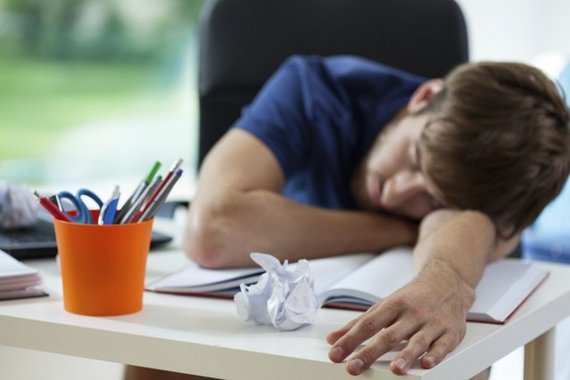
More than half of American teenagers suffer from severe sleep deprivation.
Photo credit: IStock.com/Katarzyna Bialasiewicz
The New York Times recently conjured up a "sleep-deprivation theory" about presidential hopeful Donald Trump, who says he needs only three or four hours of sleep each night, and sometimes just 90 minutes. "This is kind of amazing because he really demonstrates all the symptoms of chronic sleep deprivation, like inability to process even basic information, instability, mood swings, anger outbursts, regurgitation of incomprehensible pablum, and false memories." So said Arianna Huffington, author of The Sleep Revolution: Transforming Your Life, One Night at a Time at Bay Path University's Women's Leadership Conference in Springfield, Massachusetts, on April 29.
Huffington expressed skepticism that Trump enjoys the rare genetic mutation that allows some people to do okay on as little as four hours of sleep per night. Gene editing might someday give others that gene, but it will not likely be available for adults--even billionaires--anytime soon.
After collapsing from sleep deprivation, burnout, and exhaustion in 2007, Huffington made sleep a priority in her life. She refers to sleep deprivation as "the new smoking" because it is linked to heart attack, stroke, diabetes, obesity, Alzheimer's disease, and a weakened immune system. "Getting enough sleep," she concludes, "is really is a matter of life and death."
Scientists believe that the main function of sleep may be to "take out our neural trash," cleaning out wastes that accumulate in our brains from our daily thinking. Sleep deprivation makes people irritable and moody and curtails their creativity and problem-solving abilities, Huffington reports. It robs them of joy and the ability to be fully present.
Are you sleep-deprived? Chances are good the answer is yes, especially if you live in the United States. The Centers for Disease Control and Prevention estimate that more than 1 in 3 American adults don't get enough sleep, which the agency describes as 7 hours per night. American adolescents--who need more sleep, about 9 hours per night to function optimally--fare even worse. Only 8 percent of them get the sleep they need, and 59 percent of American adolescents suffer "severe sleep deprivation," meaning they get 6 hours or less most school nights. The American Academy of Pediatrics advises that middle schools and high schools should start later in the morning to give teenagers a better shot at getting enough sleep.

Queen fire ants sleep for about 9 hours per day, falling asleep 90 times for 6 minutes at a time. Deeply sleeping queens frequently quiver their folded antennae. Researchers propose that this "rapid antennal movement" might be analogous to rapid eye movement in vertebrates. Workers sleep half as much as queens, taking about 250 power naps a day, each lasting just over 1 minute.
Photo credit: Pollinator, https://commons.wikimedia.org/wiki/File:Fire_ant_queens_3589.jpg
If sleep is so important, why aren't we getting enough of it? Since the time of the Industrial Revolution, our workaholic society has devalued sleep, admonishing us to work, work, work. Many of us boast a "mind over matter" mentality and feel a sense of pride when we override our physical needs. Huffington reminded her listeners at the conference that adequate, high-quality sleep is the foundation for clear thinking and optimum health; that people are more than their jobs, their successes, and their failures; and that we don't have to be constantly "on."
Many of us let electric lights and electronic devices interfere with sleep and disrupt our circadian rhythms, which are based on natural cycles of light and dark. Throw in unhealthy diet, lack of exercise, and too much stress, and it's a wonder we can sleep at all.
- Sleep at least 7 to 9 hours each night (unless you are one of those exceedingly rare people with the genetic mutation that allows you to do well with 4 to 5 hours of shut-eye).
- Avoid waking up to an alarm and the resulting surge of cortisol, which triggers a fight-or-flight response. You need to move through all four stages of sleep, including rapid eye movement, the deepest one. Awakening prematurely is like pulling laundry out of the washing machine, still dirty and wet, before the machine has finished its full cycle, Huffington said.
- Keep light and technology away as you transition to sleep and while you sleep. When she is traveling, Huffington uses masking tape to cover up the small lights on electronics in her hotel room.
- Take a hot bath with Epsom salt (or take a shower) at bedtime.
- Drink a cup of calming herbal tea, such as licorice or lavender.
- Make your sleep environment luxurious. For example, invest in fluffy pillows or dedicated, comfortable nightwear.
- Realize the day is over and stop worrying about tasks undone or things that aren't working.
- Close the day by writing down three things--small or large--for which you are grateful.
- Water as hot as you can tolerate
- 2 cups of Epsom salt (magnesium sulfate)
- 1/2 to 1 cup of baking soda (sodium bicarbonate)
- 10 drops of lavender oil
- 1 human
That's it--it's simple, and so effective. According to physician and bestselling author Dr. Mark Hyman, who created this "UltraBath" recipe, immersion in a hot bath "relaxes your muscles and reduces tension physically and psychically." The heat raises your body temperature, inducing sleep. Increased sweating moves toxins out of your body. Lavender oil relaxes your nervous system and lowers your levels of cortisol, the primary stress hormone. Magnesium sulfate is absorbed through the skin. According to Dr. Hyman, magnesium is "an antidote to stress, and the most powerful relaxation mineral available." Sulfate helps your body flush out toxins. Baking soda promotes an ideal pH for healing, detoxification, and optimal cellular function. Removing toxic substances from your body improves your sleep. And, science aside, soaking in a bath, particularly Dr. Hyman's UltraBath, feels and smells fantastic.

In her speech at Bay Path University, Arianna Huffington predicted that one day, parents will admonish their children who resist bedtime: "If you don't sleep, you're going to turn out like Donald Trump."
Photo credit: Robert Charles Photography
Huffington described Donald Trump as "both a buffoon and dangerous," saying that The Huffington Post "tried to cover him as a buffoon in the entertainment section for the longest possible time." Now he's in the news section. Maybe, after he's had some restorative baths and long snoozes, Huffington Post editors could move him from the news section to the healthy living page.
Now, if only this practice of baths and adequate sleep would go viral, spreading relaxation, reason, and calm throughout the land....
Ellen Moyer, Ph.D., P.E., is an independent environmental consultant and author of her upcoming third book titled Our Earth, Our Species, Our Selves: How to Have Fun Creating a Sustainable World. You can connect with her on LinkedIn and Facebook or find more information or sign up for updates on her website.